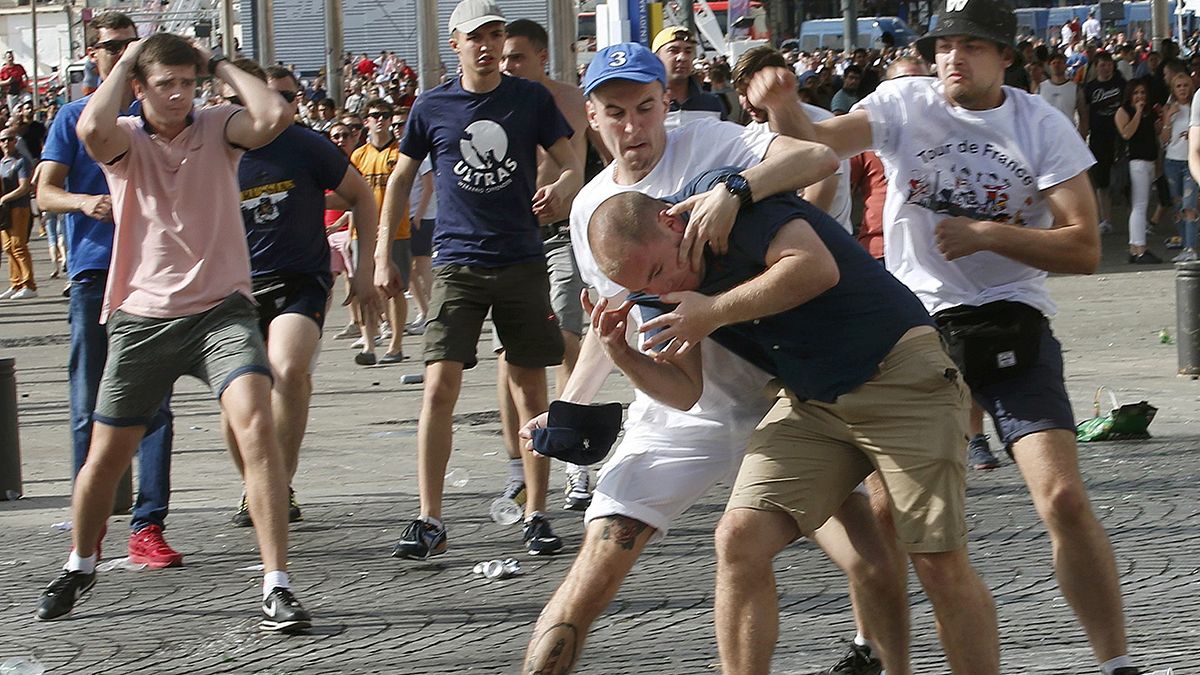Paula Vilaplana, Euronews (E): ‘‘Hello and welcome.
Paula Vilaplana, Euronews (E): ‘‘Hello and welcome. France is currently immersed in Euro 2016. This celebration of European football has however encountered some problems along the way, notably from a few extreme groups of supporters.
‘‘Here to talk about this if author of ‘In the head of a Hooligan’ Vivien Couzelas. Thank you for being here with us today Vivien.
‘‘To start with, you explain in your book that certain hooligans do not like football. So, like the title of your work, what is ‘In the head of a hooligan’‘?
Vivien Couzelas (VC): ‘‘I asked myself do hooligans like football or do they simply like fighting? This investigation made me realise that to analyze hooliganism, you can not generalize. What I mean by that is certain hooligans turn up to fight and only fight because that’s what they like, not the football and then – speaking to one hooligan in particular – he told me that the football came first for him and then fighting. This guy was driven into hooliganism after going to the stadium and watching games. But some hooligans just like fighting and that is all there is too it.’‘
E: ‘‘The acts of violence in Marseille were provoked by these groups of hooligans. Can we say these people came over with the sole intention of causing problems?’‘
VC: ‘‘Contrary to what people thought initially about the scuffles between the English and Russians, the majority of the English fans that were present that day in Marseille did not come over with the intention to fight. The majority of registered English hooligans were not allowed to make the trip over to France.
‘‘The fans that came over came over to to enjoy the party, to drink. Of course a most of the fans didn’t do anything wrong as they simply came over to watch a football games; but some of the Russians came over to fight and then you had the Marseille locals joined in to settle a score with the English.’‘
E: ‘‘In the wake of these incidents the French government prohibited the sale of alcohol during the matches. What do you think of this decision?’‘
VC: ‘‘Already it was to bring up the issue of drinking alcohol, in one way or another was a way for the government to send a message. It was a good idea to ban alcohol, the night before and the day of the matches.
‘‘Despite this measure being a good one, this was inconsequential concerning the Russian hooligans who were present that day because you have to know that, in fact, these Russian actually don’t drink alcohol. The banning of alcohol will effectively diminish certain problems, certain risks. But it doesn’t solve the problems deep down.’‘
E: ‘‘Do you feel these issues took the French authorities by surprise, as they were concentrating on other security threats?’‘
VC: ‘‘Before Euro 2016 there were three objectives for the French government and the French police. One was to prevent a terrorist attack. The second was to avoid clashes between different groups of hooligans; like what happened between the English and Russians. The third was to prevent clashes between hooligan groups and locals, but that’s what happened in Marseille, as we saw.
‘‘But there also a fundamental problem which is that the police were no prepared for this. Just as in any discipline or job sector, how do you prepare for an event? Well, you go to the site, get a hands-on knowledge of the terrain. But, we are in France where we are in completely zero-tolerance system. At the matches at high-risk in France; we ban the registered hooligans from travelling, we prohibit banners, we ban flares.
‘‘The French police however are unable to manage large crowds, large crowds that have been drinking heavily.
‘‘I believe this leads to a lack of policing police; it is because they are not trained at this level. And they paid the price when the Euro started because they were not prepared for it.’‘
E: ‘‘Do you believe there is a way to end hooliganism?’‘
VC: ‘‘In France we model ourselves on how the English deal with hooligans, meaning we take a zero-tolerance approach, banning travelling, we ban any materials that can be thrown or lit, things that can ruin a match.
‘‘But, there is also another way to deal with hooliganism, like in Germany where there is a compromise between repression and communication. This is a preventative measure and although Germany has not ridden itself of hooliganism entirely contrary to popular belief, but they are managing it, with various sections in the stands. That is a good way to deal with hooliganism. It’s a good mix of methods.’‘
